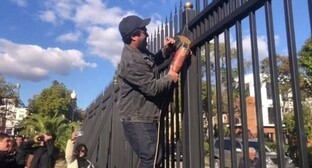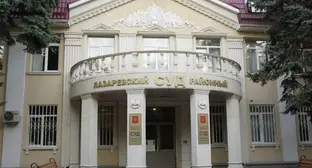17 December 2010, 23:20
Mufti of Kabardino-Balkaria Anas Pshikhachev struggled with extremism and illegal persecution of Muslims
Anas Pshikhachev, Mufti of Kabardino-Balkaria, who perished from hands of assassins, had repeatedly raised his voice against religious extremism. Well before the events of October 13, 2005, in Nalchik, when militants attacked the power objects of the city, the Mufti warned from the pages of local newspapers that "Wahhabism can bring great harm to the republic." At the same time, Anas Pshikhachev has repeatedly and openly opposed illegal actions of law enforcement officials against Muslims.
Let us remind you that Anas Pshikhachev was shot dead in the evening on December 15.
After the events of October 13, 2005, the Mufti said in an interview: "It's impossible to justify and explain the actions of these people. These days, we often hear the word 'jihad', but those who committed this act, have nothing to do with this notion. Russian Muslims have no reason to declare jihad: nobody forbidden them to pray, give alms and execute Islamic canons. There are, of course, cases of rights violations, but it is the fault of individual bureaucrats, and there are courts to protect human rights. We should seek justice there."
His opponents accused him of collaboration with the authorities, but the Mufti saw nothing bad in it, saying that Russian Muslims live in a secular state. "We should not separate the secular state from the spiritual life, because we are all responsible for the situation in the Caucasus," he said.
In 2008, the Mufti said that there were no more problems with oppressions of Muslims in the Kabardino-Balkarian Republic (KBR). "I don't understand terrorist manifestations, existing in the republic. While earlier it was explained by the fact that law enforcement bodies harassed Muslims; but today nobody is persecuted. Today, the reason is not in religion... We have always said that the West is backing terrorists and extremists in the KBR," said the Mufti.
At the same time, Anas Pshikhachev had been repeatedly opposing illegal actions of law enforcement officials against Muslims.
"I wonder how they manage to count potential extremists in the republic! They don't come to get registered! On the contrary, they are notable for hiding their beliefs. Such person can be revealed only through long and patient communication. This job requires extreme caution and patience. As far as I know, the MIA has no such professionals," said Pshikhachev.
"We must work together to avoid such distortions. Law enforcement agencies should return people's trust; and only then people will start to communicate," he said.
"We regularly meet young Muslims who are extremist-minded. We've managed to re-convince many of them. I was glad when at a press briefing at the MIA it was reported that the bandit underground had failed to involve juveniles into their actions," said Pshikhachev.
"I believe that the wave of killings and violence in Kabardino-Balkaria is associated with the termination of Arsen Kanokov's presidency. Those who are behind it are trying to show to Moscow that the president is not coping well, and he should be changed. Direct executors of these crimes may not know the final goal. This is for them that religious slogans are used as shelter," said the Mufti.
In his opinion, media were not always correct in interpreting the concept of national and religious extremism: "Religious extremism is when persons, ignorant of religion, take separate phrases out of the context of the Koran and use them for their own purposes."
"It's no secret," he used to say, "that Russia is artificially presented under the image of the so-called 'enemy of Islam'. An example may be found in annual report of the US Governmental Commission, where Russia was included into the list of countries, where there are problems with the freedom of religion." According to the Mufti, the same propaganda tools were used by extremists who, while acting in unison with the Western political technologists, manipulated the religiously undereducated youngsters.
In 2007, Anas Pshikhachev expressed his concern over the rampant fascism in Russia. "I am concerned about what is happening in Russian cities, when they kill non-Russians. It is necessary to toughen punishments for murders motivated by ethnic hatred, and for racial crimes," Mr Pshikhachev said in those days in his interview to the "Caucasian Knot".
Along with that, he did not support the idea of creating Muslim housing complexes: "I can't support this idea, because it turns out that Muslims will live separately from the rest of the society, forming a sort of a state within a state. In this case, a conclusion may be suggested: either Muslims are second-grade persons, or all the rest are such."
As it has become known now, Mufti had repeatedly received threats. Thus, during his meeting with Alexander Khloponin, Russian President's Plenipotentiary in the NCFD (North-Caucasian Federal District), he said: "They come, look impudently into my face and say: 'We've decided to kill you. What do you think of it?'" He said that Muftis of Northern Caucasus needed guarding.
Arsen Kanokov, President of Kabardino-Balkaria, said during Mufti's funeral on December 16 in Nalchik: "I knew Anas-Hajji very well - he was modest and shy, but very firm in matters of principle, which he considered important. He resolutely stuck to his position in defending traditional Islam."
"I know what they told him: we've sentenced you to death. They were not joking. But he was not afraid. And he opened his door to strangers, because this is the custom of clergymen. He couldn't act differently. He perished as a hero," said Ismail Berdiev, Chairman of the Coordination Council of Muslims of Northern Caucasus, and added that Pshikhachev had no guards, because "Allah guards his churchmen."
"Not only Muslims, but also Orthodox believers and Jews came to share our grief. Great thanks to them for this," said Khyzyr Misirov, deputy chairman of Spiritual Department of Muslims of the KBR.
Father Valentine, Dean of the Orthodox Churches of Kabardino-Balkaria, called the death of Anas Pshikhachev his personal tragedy. "Literally the day before," told the priest, "we together passed a statement concerning the events in Moscow with an appeal to be restrained and reasonable. My hand still feels the warmth of his live hand."
During the funeral, Anas-Hajji's father recalled, with tears in his eyes, how thoughtful his son was. Every morning he went to his father, sat on his bed and talked with him for a long time, asking about his health and worries.
As known now from duly informed sources, the video surveillance cameras installed at the house of Anas Pshikhachev in the "Alexandrovka" district of Nalchik recorded the suspects. They have been identified as residents of Nalchik Astimir Mamishev, born in 1988, and Azparukh Shamaev, born in 1990. Currently, they are searched.
Earlier these suspects had already been put on the wanted list under another criminal case - assault on the life of a law enforcement officer.
Author: Luiza Orazaeva; Elena Khrustaleva Source: CK correspondents




